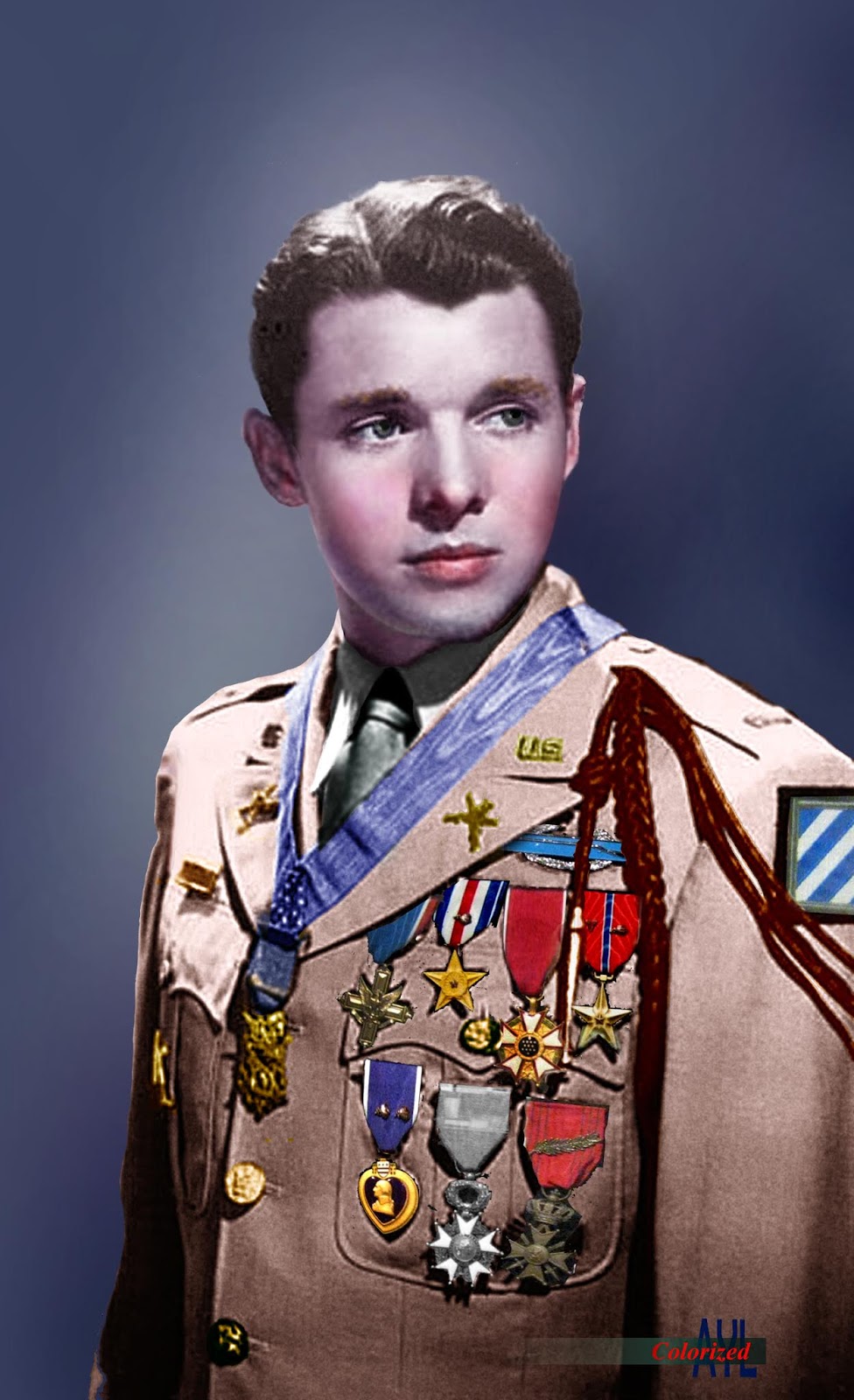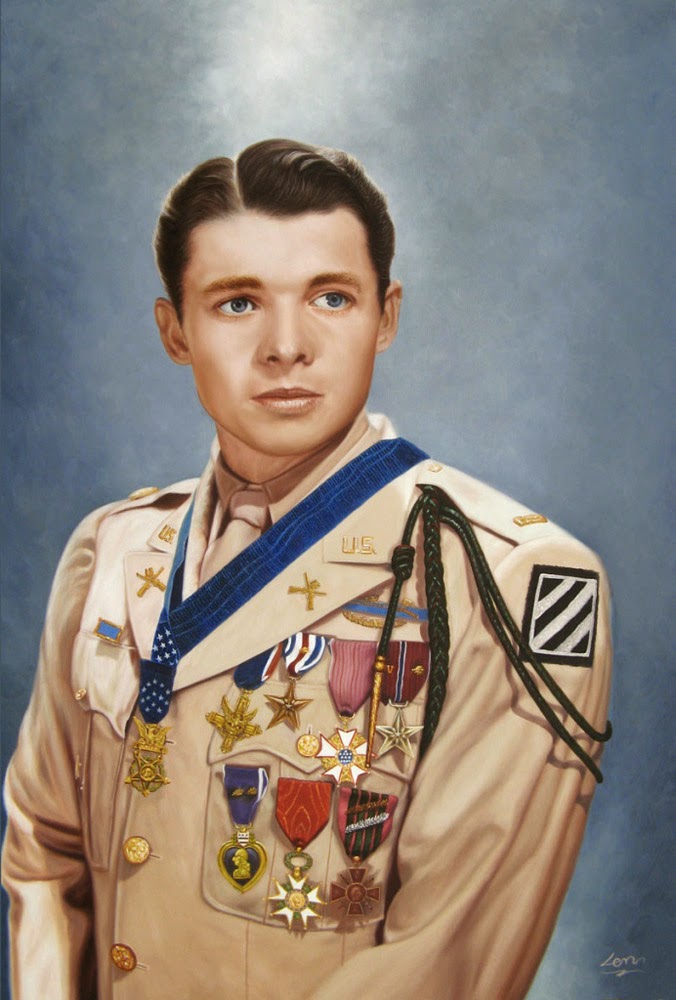Audie Murphy remains one of the most iconic figures in American military history. Born in a modest Texas family, he rose to prominence as the most decorated soldier of World War II. His acts of valor and bravery on the battlefield became legendary, earning him numerous awards and decorations. Despite his challenging upbringing, Murphy's dedication and commitment to service made him a symbol of courage and perseverance.
Murphy's life was marked by extraordinary achievements both in and out of the military. After the war, he transitioned into a successful career in Hollywood, starring in several films that depicted his wartime experiences. His autobiography, "To Hell and Back," became a best-seller and was later adapted into a film where Murphy played himself, further cementing his status as a national hero. Despite the glitz and glamour of Hollywood, he remained humble and focused on advocating for veterans' rights.
Beyond his public persona, Murphy was a deeply private individual who struggled with post-traumatic stress disorder (PTSD), a condition not widely understood during his time. He used his platform to raise awareness about the struggles veterans face after returning from combat. His legacy is not only one of military valor but also of compassion and advocacy for mental health, inspiring generations to recognize and address the invisible scars of war.
Table of Contents
- Biography of Audie Murphy
- What Was Audie Murphy's Early Life Like?
- Audie Murphy's Military Career: A Testament to Bravery
- What Are Audie Murphy's Heroic Deeds?
- How Did Audie Murphy Transition to Post-War Life?
- Audie Murphy's Film Career: From Soldier to Star
- To Hell and Back: Audie Murphy's Story in Print and Film
- Personal Life and Challenges of Audie Murphy
- Audie Murphy's Advocacy for Mental Health
- Awards and Honors of Audie Murphy
- Audie Murphy's Legacy: Impact on Military and Society
- How Is Audie Murphy Commemorated?
- Influence of Audie Murphy on Popular Culture
- Frequently Asked Questions about Audie Murphy
- Conclusion: Remembering Audie Murphy
Biography of Audie Murphy
Audie Leon Murphy was born on June 20, 1925, in Kingston, Texas. He was one of twelve siblings in a family struggling to make ends meet during the Great Depression. Despite the hardships, Murphy's early years were characterized by resilience and determination, traits that would define his future endeavors.
His father abandoned the family, leaving his mother, Emmett Berry Murphy, to raise the children. Sadly, she passed away when Audie was just sixteen, prompting him to leave school and work to support his siblings. These early experiences of loss and responsibility shaped his character and fueled his desire to join the military.
| Full Name | Audie Leon Murphy |
|---|---|
| Birth Date | June 20, 1925 |
| Birth Place | Kingston, Texas, USA |
| Death Date | May 28, 1971 |
| Occupation | Soldier, Actor, Writer |
| Spouse | Pamela Archer |
| Children | 2 |
What Was Audie Murphy's Early Life Like?
Audie Murphy's childhood was marked by adversity and poverty. Growing up in a sharecropper family, he learned the value of hard work and perseverance from an early age. After his father's departure, Murphy took on various jobs to help his family survive, including picking cotton and other farm labor.
Despite these challenges, Murphy was determined to improve his situation. His early exposure to firearms while hunting for food sharpened his marksmanship skills, a talent that would later serve him well in his military career. However, the untimely death of his mother was a turning point that deeply affected him, instilling a sense of duty and responsibility that propelled him forward.
Audie Murphy's Military Career: A Testament to Bravery
When World War II broke out, Murphy was determined to serve his country. Despite being rejected by the Navy and the Marines for being underweight and underage, he persisted and eventually enlisted in the Army in 1942 with the help of his older sister, who falsified his birth certificate.
Murphy's military career was nothing short of extraordinary. He quickly rose through the ranks, demonstrating exceptional bravery and leadership. Serving in the European Theater, he participated in numerous battles, including the liberation of Rome and the invasion of southern France. His actions during these campaigns earned him a reputation for fearlessness and tactical brilliance.
What Are Audie Murphy's Heroic Deeds?
One of Audie Murphy's most notable acts of heroism occurred on January 26, 1945, in the Colmar Pocket in France. Despite being severely outnumbered and wounded, he mounted a burning tank destroyer and single-handedly repelled an enemy assault, using the vehicle's machine gun to inflict heavy casualties. His actions that day earned him the Medal of Honor, the United States' highest military decoration.
Throughout his military service, Murphy received numerous awards, including the Distinguished Service Cross, two Silver Stars, and the Legion of Merit, among others. His bravery and leadership inspired his fellow soldiers and made him a symbol of American heroism during the war.
How Did Audie Murphy Transition to Post-War Life?
After the war, Audie Murphy faced the challenge of transitioning to civilian life. His wartime experiences had left a deep impact on him, and like many veterans, he struggled with post-traumatic stress disorder (PTSD). Despite these difficulties, Murphy sought to build a new life for himself.
Initially, he was unsure of his future path, but a chance encounter with actor James Cagney in Hollywood opened the door to a new career. Murphy's natural charisma and authentic portrayal of his wartime experiences resonated with audiences, leading to a successful career in film and entertainment.
Audie Murphy's Film Career: From Soldier to Star
Audie Murphy's entry into Hollywood marked the beginning of a prolific acting career. He appeared in over 40 films, often playing roles that mirrored his real-life experiences as a soldier. His boyish charm and genuine persona made him a popular figure in the industry.
Some of his notable films include "The Red Badge of Courage," "The Quiet American," and "The Unforgiven." Murphy's performances were praised for their authenticity and emotional depth, earning him a place among the era's leading actors.
To Hell and Back: Audie Murphy's Story in Print and Film
"To Hell and Back," Murphy's autobiography, was published in 1949 and quickly became a best-seller. The book candidly recounted his wartime experiences, providing readers with an intimate look at the realities of combat.
In 1955, the book was adapted into a film starring Murphy as himself. The film was a critical and commercial success, further solidifying his status as a national hero. Murphy's portrayal of his own experiences brought authenticity to the screen, resonating with audiences and veterans alike.
Personal Life and Challenges of Audie Murphy
Despite his public success, Audie Murphy's personal life was fraught with challenges. He married actress Wanda Hendrix in 1949, but the marriage was short-lived, ending in divorce in 1951. Murphy later married Pamela Archer, with whom he had two children.
Murphy's struggles with PTSD affected his personal relationships and mental health. He often experienced intense nightmares and bouts of depression, which he candidly spoke about in an effort to raise awareness and understanding of veterans' mental health issues.
Audie Murphy's Advocacy for Mental Health
Audie Murphy was a pioneer in advocating for mental health awareness, particularly for veterans. He used his platform to highlight the psychological toll of war and the need for better support systems for those returning from combat.
Murphy's openness about his own struggles with PTSD helped to destigmatize mental health issues among veterans. He worked tirelessly to promote better understanding and treatment options, leaving a lasting impact on mental health advocacy.
Awards and Honors of Audie Murphy
Audie Murphy's career was distinguished by numerous awards and honors, reflecting his bravery and contributions to both the military and society. In addition to the Medal of Honor, he received over 33 American and foreign military decorations, including:
- Distinguished Service Cross
- Silver Star (two awards)
- Legion of Merit
- Bronze Star with "V" Device (two awards)
- Purple Heart (three awards)
These awards not only recognized his valor but also his enduring legacy as one of America's greatest war heroes.
Audie Murphy's Legacy: Impact on Military and Society
Audie Murphy's legacy extends beyond his military achievements. His life story continues to inspire countless individuals, serving as a testament to the power of courage and determination. He remains a symbol of heroism and resilience, embodying the spirit of the American soldier.
His contributions to mental health advocacy and veterans' rights have had a lasting impact, paving the way for greater awareness and support for those who have served. Murphy's legacy is one of hope, reminding us of the importance of compassion and understanding in the face of adversity.
How Is Audie Murphy Commemorated?
Audie Murphy's memory is honored through various memorials and tributes. He is buried at Arlington National Cemetery, where his gravesite is one of the most visited. His headstone, engraved with the simple inscription "Texas," reflects his humble nature and deep connection to his home state.
Numerous monuments and museums across the United States pay tribute to Murphy's life and achievements, ensuring that his legacy is remembered and celebrated by future generations.
Influence of Audie Murphy on Popular Culture
Audie Murphy's influence extends into popular culture, where his story has been depicted in films, books, and other media. His life serves as a source of inspiration for countless artists and storytellers, who continue to draw from his experiences to create compelling narratives.
Murphy's portrayal in films and literature has helped to shape the public's understanding of war and heroism, highlighting the complexities and challenges faced by those who serve.
Frequently Asked Questions about Audie Murphy
1. What inspired Audie Murphy to join the military?
Murphy was motivated by a sense of duty and patriotism, as well as a desire to support his family financially after his mother's death.
2. How many awards did Audie Murphy receive?
Murphy received over 33 American and foreign military awards, making him one of the most decorated soldiers of World War II.
3. What is Audie Murphy's most famous film?
"To Hell and Back," based on his autobiography, is considered his most famous film, where he portrayed himself.
4. How did Audie Murphy contribute to mental health awareness?
Murphy advocated for veterans' mental health, sharing his experiences with PTSD to promote understanding and support for mental health issues.
5. Where is Audie Murphy buried?
He is buried at Arlington National Cemetery, and his gravesite is a popular destination for visitors.
6. What is Audie Murphy's legacy?
Murphy's legacy is one of heroism, mental health advocacy, and inspiration, impacting both military and civilian communities.
Conclusion: Remembering Audie Murphy
Audie Murphy's life story is one of extraordinary courage and resilience. From his humble beginnings in Texas to becoming America's most decorated war hero and a successful Hollywood actor, his journey is a testament to the power of perseverance and dedication. Murphy's advocacy for mental health and veterans' rights has left an indelible mark on society, inspiring generations to recognize the importance of compassion and understanding. As we remember Audie Murphy, we honor his legacy and the enduring impact he has had on our world.
For more information on Audie Murphy's life and achievements, you can visit the official Audie Murphy/American Cotton Museum website here.
You Might Also Like
The Tragic Passing Of Aubreigh Wyatt: A Comprehensive ExplorationUltimate Guide To Egamovies: Your Go-To Platform For Movies And Series
Mary Lou Retton: Icon Of Gymnastics And American Sports
Alluring Kai Trump Bikini Styles: A Trendsetter's Guide
Insights Into The Life And Accomplishments Of Vedan Raina
Article Recommendations
- Unveiling The Enigma The Life And Legacy Of James Bean Thornton
- The Comprehensive Guide To Sustainability Laws Regulations Frameworks And Compliance
- Exploring Michael Feinsteins Net Worth A Comprehensive Insight

